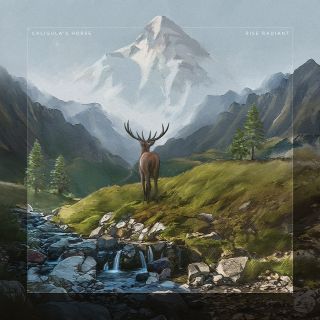At a time when the world is in turmoil, optimism feels like an act of defiance, yet
with Rise Radiant, Caligula’s Horse celebrate the resilience of the human spirit and mankind’s capacity for picking itself up and getting back on its feet in the face of adversity. The new record is the Australian band’s most ambitious and diverse thus far and, in a break from its 2017 predecessor, In Contact it’s not a concept album. That was a deliberate choice explains lead guitarist and producer Sam Vallen, who founded the group with singer Jim Grey in Brisbane, Australia back in 2011. Always eager to keep moving forwards, they were determined not to repeat what they’d made in the past, and so as they began pre-production the quintet met up to discuss how they would approach what would soon become Rise Radiant.
“What we do is we take stock of what we’ve done,” says Vallen. “Maybe it’s with the previous album but more likely it’s a larger take on the things we’ve done since the very beginning of our career, and we try and work out how we can position the next record as being a bit of a contrast. From Bloom [their third album, released in 2015] to In Contact, we went from having this very austere and direct album to a record which was much more dynamically intense and much more of a concept album, an album that has an interweaving narrative so all the songs link. When it came time to do Rise Radiant we said, ‘Okay, how do we break away from that without just repeating what we’ve done with the other non-concept albums of our career?’”
The answer that they arrived at was to write music that feels more personal than ever, expressing its messages without the need to do so via the medium of a cast of fictional characters. “We said we’re going to focus on making an album that is a direct emotional statement,” says Vallen. “Each of the songs should embody something totally different, they’re not linked by this concept. With lyrics, rather than talking through mythology or an extended metaphor, a lot of it instead is ‘I’ or ‘we’ and ‘me’.”

However, that didn’t mean it was easy to avoid the lureof the venerable prog concept album format. “The problem with us is that we’re prog wankers and we immediately start moving towards similar thematic ground,” says Vallen with a sigh. “When we did start working on the lyrics and the meaning, the ideas behind the songs, we realised there really was this shared theme, not enough that you could ever call it a concept album but enough that you could trace it through the different songs. That theme, when we first uncovered it in our own writing, was something that I would call
human experience.”
This led the band towards drawing upon their own psyches, their unique lived experiences, in writing the lyrics. “As we started to delve into that more, we realised there is one particular human experience that this album embodied more than any other,” says Vallen. “The experience is what we referred to as getting back up again. It’s really easy for an artist to preach about strength, power, love, all of these things that are very positive and very lofty and, I would argue, safe emotions. We thought it would be more interesting to say, ‘What if instead we dwelled a little bit on how beautiful human fragility is?’ It’s not about what you overcome, it’s about the very fact that you’re willing to get back up and face another challenge.”
This core idea resonated with Vallen and Grey from their own histories, dealing with changes in the band’s line-up, enduring tough times on the road, and facing transformations in their lives offstage, all feeding into the songs.
“[The track] Oceanrise is a musing on your own mortality and saying there’s a beauty to the idea of legacy, the idea that you are temporary,” reveals Vallen. “The Ascent and Autumn are two parts in this longer examination of fatherhood that Jim and I were both really fascinated by because we’ve both recently become fathers. We wanted to explore looking at the idea of being a prospective father, knowing that this is coming, knowing there is a big change, knowing that you need to overcome that change. In other words, looking at it almost selfishly, as you do when you approach fatherhood, but then The Ascent takes over immediately after that and you realise that the moment you have a child, your life is no longer about you in a really beautiful way. Your ego is nothing. It’s insignificant because what’s much more important is being a guiding light for a new soul, someone whose legacy far outstretches your own, so we wrote it using this mountain metaphor. Instead of approaching it as this summit you must scale, it’s about creating some beacons as far up as you can and accepting that you will never finish the climb. Maybe that’s a more beautiful part of the story, knowing you have set as much up as you can for those who follow.”

Vallen has multiple roles within Caligula’s Horse. In addition to his guitar-playing duties, he’s one of the main songwriters and also their producer. In that latter role, he’s a stickler for making detailed demos of new songs to make sure everything is working musically.
“I teach production and a couple of other things at university,” he says, “and one of the things I always say, is when you’re sitting in the band room with your bandmates and everything is playing at deafening volume, everything sounds exciting and amazing and perfect, and the moment you record all that and listen back to it, suddenly it doesn’t sound so perfect anymore. To have this simulation of the finished product, even if it doesn’t yet have the liveliness of the performances, the energy that all our interaction brings, what it does have absolutely is evidence of whether something works or not, so I can start pulling on all those little threads to make sure they’re all perfect. In that sense, I could take or leave being an instrumentalist to be honest. I enjoy creating that part and I enjoy the performative element of it all, but what I much prefer is that big picture.”
The musician-cum-producer picks out Steven Wilson as someone who provides a source of inspiration when the time comes for him to don his producer’s hat. “He’s always been a fantastic guitar player,” he explains. “Admittedly, the guitar solos in Caligula’s Horse are probably a little more flashy just by virtue of the fact that we like this big exuberant progressive metal thing.”
But the main thing that Vallen admires in Wilson’s work is his visionary ability to create records that have a completely different aesthetic from anything else around them. “He’s reinventing himself constantly. Now again, I’m not even comparing our process to that, but he’s definitely someone I admire. Robert Fripp from King Crimson is another good example in the same style of music. Maybe our style of music just tends to have an in for that type of personality, let’s call it the control freak madman.”

Control freakery notwithstanding, Rise Radiant saw Vallen hand the responsibility for mixing the album over to Jens Bogren, the Swedish metal producer and engineer who’s worked with Opeth and Katatonia, and who also mastered Bloom and In Contact. One of the most outstanding features of Rise Radiant is the sheer dynamic range of the music, from full-blown prog metal heaviness to moments where the volume drops down from a torrent to a trickle. It’s an attribute rarely found in modern mixing, where everything is still heavily compressed in the wake of the loudness wars, but Vallen was confident that Bogren was the right man to bring out the full textures of the sonic landscape that the band had built in the studio.
“He’s been one of my biggest audio heroes since the mid-2000s,” he says. “I remember hearing Opeth’s Watershed, but also albums like Katatonia’s The Great Cold Distance; he did a whole bunch of progressive metal albums in that period which sounded sonically unlike anything I was hearing around them at the time, especially with Watershed. You hear this record where you’re not hearing a big snare trigger, you’re not hearing guitars that are always full and always huge. It had that contour I was wanting on this album where there is all of this variety in sound.”
Vallen’s notes for Bogren included the direction that the album should sound: raw, real, performative and dynamic, and the latter attribute was further intensified with input from Thomas Waber, head of InsideOut, who encouraged Vallen and Bogren to go further during the mixing process, making the quiet moments really contrast with the big, heavy sections.
“We were going through the mixes while Jens was doing them and he was saying, ‘It’s too loud, it’s too loud.’ We’d say, ‘I thought it was really quiet but okay, let’s bring it back a bit more if you reckon.’ I remember letting that sit with me for a little while, listening to these far less compressed, very dynamically mixed songs,” says Vallen. “If music is going to have impact, it needs to have a contour. It can’t just be a flat line of sound; it must have a sense of ebb and flow.”
The album’s central messages about resilience, temporality, and fragility seem to capture the zeitgeist of a world under the shadow of a pandemic. Caligula’s
Horse had scheduled an entire touring regime to support Rise Radiant, but all those plans have now been put on hold. However, despite the impossibility of going on the road, they were determined to press ahead with putting the album out into the world while the band themselves are staying home in Australia.
“We said we’re not going to change the release of this album because, if nothing else, this is a really important time to release an album that we think has a positive message,” says Vallen, “and it kind of foils the pessimistic views that so many people seem to be extolling about the music industry right now. It’s impossible to look at music forums and not feel this sense of apathy, like, ‘What are we going to do?’ So we thought, ‘Okay, tours can be postponed, it happens when it can happen’, but what we thought was much more important was we stuck to our guns. We made sure that our fans didn’t feel like we were pulling the rug out from underneath for no reason when everyone is already experiencing something kind of terrible right now. We’re still there offering that little piece of music that we uniquely offer the world for good or ill.”
This article originally appeared in issue 110 of Prog Magazine.


